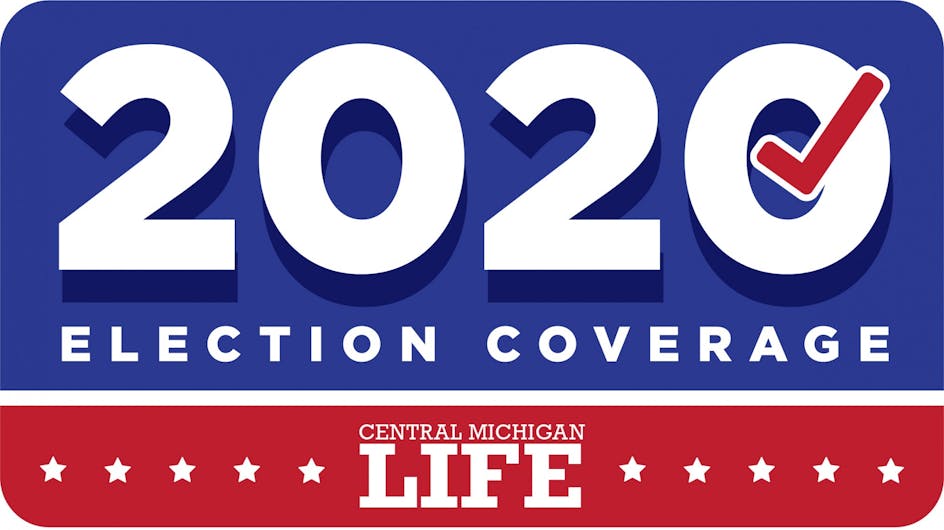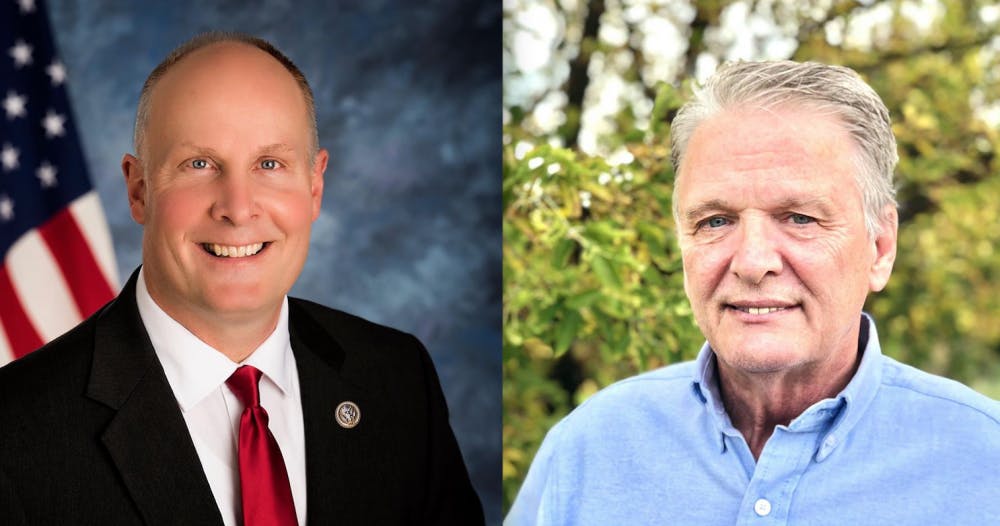Moolenaar, Hilliard compete for Michigan’s fourth congressional district

As the presidential election rages forward, U.S. congressional districts are running their own elections, including Michigan’s fourth district.
The fourth district covers most of mid-Michigan from Cadillac to north of Lansing.
Republican Congressman and member of the House Appropriations Committee John Moolenaar has held the seat since 2015. Moolenaar was born and raised in Midland, has a bachelor’s degree in chemistry from Hope College and a master’s degree in Public Administration from Harvard University, according to his website.
Democratic candidate Jerry Hilliard grew up in Harrison. He has a bachelor's in Business Education, Physical Education and Biology from Central Michigan University. He has a master’s of business administration from the University of Michigan-Flint and a master’s of arts in Sports Administration from Central Michigan University.
Central Michigan Life reached out to each candidate about COVID-19, flood relief, police reform and what they would do for college students.
CM Life: What issue is most important for your district?
Moolenaar: Right now, the most important issue is defeating the virus and helping Michigan workers and small businesses recover and rebuild. There was a strong economy before the pandemic with low unemployment, and in some cases, the number of jobs available was higher than the number of people looking for work. We need to rebuild the economy, so graduates from CMU, and all Michigan workers, can pursue good-paying job opportunities. We also need to help small businesses. Small businesses are crucial to so many of the communities in mid and northern Michigan, including Mount Pleasant and the area around CMU. I will be working to support policies that help those who need it most, including a $2,000 child tax credit for working families, forgivable loans for small businesses, and funding for job-training programs that prepare workers for opportunities in the skilled trades.
Hilliard: There are many important issues. However, to me it is the economy of our future. We need a long period of wages rising faster than prices, which is the only way to raise the standard of living for working families. We can do this by raising the minimum wage to a living wage with benefits and creating more competitive markets by changing the way we subsidize large corporations. In the past, we have subsidized large corporations without requiring them to return to society at least as much as they received in subsidies. My plan is to only subsidize companies that are paying at least a living wage and benefits such as healthcare. I see no reason why the U.S. Government should subsidize companies who take more from society than they return.
CM Life: How will you help college students?
Moolenaar: Current and incoming college students have had their education plans thrown into disarray by this pandemic. Many students started the fall semester unsure of how their classes would work and if they felt safe returning to campus. Providing funding for colleges and universities to help them prepare to resume classes was one of my priorities in Congress. That’s why I was proud to support the CARES Act, which created a $14 billion Higher Education Emergency Relief Fund to help institutions of higher education. As classes resume across the country, we will get a better sense of what kind of assistance is still needed to ensure higher education can continue safely.
Hilliard: We have to make college more affordable for students who are currently in college by subsidizing colleges like we did for the Baby Boomer generation. When the WWII generation came home from winning the war, they decided they were going to make this country into what it should be and invested heavily in the education of their children. The result was a generation that created more wealth than probably any generation in history. Investing in young people pays society back many times over as was proven by the success of the Baby Boomer generation.
CM Life: What’s the next step for COVID-19 response at the federal level?
Moolenaar: Both sides must work together to find a reasonable compromise regarding additional legislation to support the American people and the economy during these challenging times. Right now, I am working to support legislation that would help small businesses and families, as well as hospitals and those on the frontlines of the pandemic.
Hilliard: The next step will depend on who wins the presidential election. If President Trump wins, most likely nothing will change. If Joe Biden wins, he has a plan in his platform that will go into effect on day one, using science-based best practices to protect the American people. To make it effective immediately, he will have to sign an executive order so we can start protecting our citizens based on the most recent scientific research.
CM Life: How will you make efforts to improve healthcare benefits during the pandemic?
Moolenaar: One of the most consequential changes to the way health care is delivered since the onset of the COVID-19 pandemic is increased use of telehealth. I have been a strong advocate of telehealth for years as it is especially beneficial to residents of my district who struggle to find doctors reasonably close to home. I will advocate for maintaining changes that have made telehealth services more widely available, especially for Medicare beneficiaries.
Hilliard: The quickest way to improve healthcare benefits is to expand Medicaid to everyone who does not have adequate medical coverage. The system is already in place and would be able to begin coverage almost immediately.
CM Life: What still needs to be done for Midland residents recovering from the flood?
Moolenaar: Following the devastating flooding experienced here in Midland in May, I worked closely with federal, state, and local officials to secure resources needed to begin our community’s recovery. This included a bipartisan letter to President Donald Trump supporting Governor Gretchen Whitmer’s major disaster declaration request for federal assistance. This declaration granted our community access to various resources through FEMA, the Small Business Administration and the U.S. Department of Agriculture to help our area rebuild. There is still lots of work that needs to be done to make our community whole, and I will continue to keep working to ensure we have access to necessary federal resources.
Hilliard: Since the failed dam is privately owned instead of federally owned, it is more of a State of Michigan problem. The federal solution would be to subsidize Michigan with funding that would help pay for replacing the failed structure. This could be done by stand-alone legislation targeted for Michigan or as part of a major infrastructure bill that is desperately needed.
CM Life: What type of policies would you support for police reform?
Moolenaar: The tragic death of George Floyd revived an important conversation about racism and bias in the United States. I welcome this discussion and support peaceful expression of the First Amendment right to protest. Congress was recently able to come together and pass bipartisan criminal justice reform. I believe this coalition can once again come together for the betterment of the American people. I have also signed on as a cosponsor of the JUSTICE Act, which would increase funding for body cameras, improve access to disciplinary records so bad officers cannot simply jump from one department to another and invest in improved police training, with an emphasis on de-escalation and duty to intervene. A majority of the JUSTICE Act’s provisions have earned bipartisan support.
Hilliard: When we look at police reform, we have to remember that most officers are dedicated to helping their jurisdiction. But like any organization, there are people who have their own agenda. Funding does have to be restructured so there are more social workers, psychologists and teachers in the police workforce. There should be more conflict management training and psychological testing for officers. Hiring policies have to strive for more diversity in the workforce. Work rules need to be modified so that officers are evaluated not on how many arrests they make, but how they treat the people in their jurisdiction.




